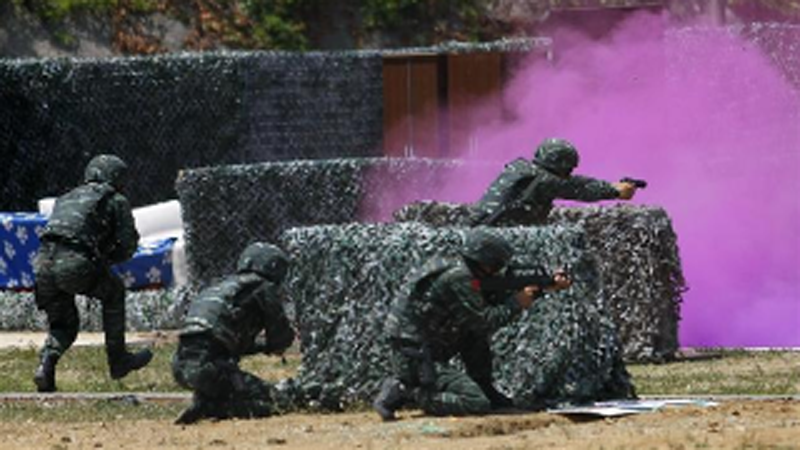 China
China
China's rapid military expansion raises global concerns
In recent years, China has been making significant strides in expanding its military capabilities, raising concerns among global powers, particularly the United States.
The 2023 China Military Power Report,mandated by the U.S. Congress, highlights China's swift military development, especially in the nuclear realm, and its increasingly assertive actions in the Indo-Pacific region.
This article critically examines China's military expansion and the potential implications for international security.
One of the most striking revelations from the 2023 China Military Power Report is China's accelerating nuclear capabilities.
The Department of Defense estimates that China possessed more than 500 operational nuclear warheads as of May 2023, a significant increase from the previous year's estimate of 400.
More alarmingly, the report suggests that China could have over 1,000 operational nuclear war heads by 2030, a pace that surpasses Pentagon projections.
While China's nuclear stockpile remains smaller than that of Russia or the United States, the development of these weapons raises serious questions about Beijing's intentions.
The report suggests that China mayalso be exploring conventionally armed intercontinental-range missile systems capable of threateningtargets in the continental United States.
This would mark a significant shift in China's military capabilities,potentially altering the balance of power in the region.China's assertive actions in the Indo-Pacific region have been a cause for concern, as highlighted in the2023 report.
The People's Liberation Army (PLA) has engaged in coercive and risky operational activities targeting foreign aircraft and maritime vessels, including lasing, reckless maneuvers, close approaches, and even ballistic missile overflights of Taiwan.
.jpg)
These actions are viewed as an attempt to restrict the U.S.presence in China's immediate periphery and limit American access to the broader Indo-Pacific region.Furthermore, China has conducted large-scale joint military exercises focused on deterring U.S. and allied operations in the region.
The PLA's continued pressure against Taiwan is also evident, as it prepares for a contingency to unify Taiwan with the People's Republic of China.
These actions not only challenge regionalstability but also threaten the security of U.S. allies and partners in the Indo-Pacific.It's important to consider China's domestic politics when assessing its military actions.
In 2022, theChinese Communist Party held its 20th Congress, during which President Xi Jinping sought to reassert hispower and secure a third term as China's paramount leader.
This context could explain the PLA's morevocal approach in 2022.Looking ahead, experts suggest that China's actions may become less vocal but more realistic in terms ofmilitary maneuvers around Taiwan.
Nevertheless, the global impact of China's military expansion remains a matter of concern, given its potential to reshape the international order.
China's rapid military expansion is occurring at a time when the world is grappling with multiple geopolitical challenges. Ongoing developments in Ukraine and the Middle East could embolden China's actions in the Indo-Pacific, as it may hope to take advantage of a distracted U.S.
While China may attemptprovocations, it is unlikely that the U.S. will de-prioritize Indo-Pacific issues in favor of other challenges.
The United States, as a global power, maintains its commitment to executing deterrence responsibilities across the globe, even during times of conflict in other regions.
The Indo-Pacific Command continues to operate with two aircraft carriers at sea, demonstrating the U.S.'s readiness to address challenges in the region.Efforts to engage in diplomatic dialogue with China have been met with refusal.
However, there areunconfirmed reports that Chinese leader Xi Jinping and U.S. President Joe Biden may meet on the sidelinesof the Asia-Pacific Economic Cooperation (APEC) summit in San Francisco next month.
Such a meeting, ifit takes place, could provide an opportunity to address these growing concerns and foster better communication between the two nations.
A solution to the conflict seems far-fetched considering china’sdraconian plan for dominating the global world order.
The rapid expansion of China's military capabilities and its assertive actions in the Indo-Pacific region pose significant challenges to both regional stability and global security.
The international community mustremain vigilant and steadfast in monitoring these developments. Moreover, diplomatic solutions areimperative to prevent potential conflicts and to sustain the peace and stability of the region.
Engagingwith China in dialogue and promoting transparency is crucial in ensuring a peaceful coexistence in an increasingly complex global landscape. The first offer should be of peace.
In the face of these challenges, diplomacy remains the most potent tool for mitigating tensions and maintaining peace.
(China Flag: Pixabay)
Support Our Journalism
We cannot do without you.. your contribution supports unbiased journalism
IBNS is not driven by any ism- not wokeism, not racism, not skewed secularism, not hyper right-wing or left liberal ideals, nor by any hardline religious beliefs or hyper nationalism. We want to serve you good old objective news, as they are. We do not judge or preach. We let people decide for themselves. We only try to present factual and well-sourced news.







